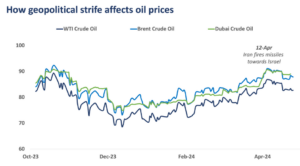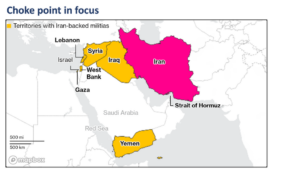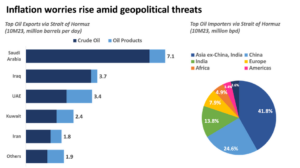In dire straits: Beleaguered shipping routes may worsen inflation
Tensions between Iran and Israel may have subsided. However, any escalation could drive inflation upwards, especially when shipping routes are disrupted.

There’s a good reason why we should be concerned about a narrow passage south of Iran.
Almost all our crude oil and petroleum imports come from the Middle East, and a significant part of those imports pass through the Strait of Hormuz, which connects the Persian Gulf and the Gulf of Oman.
Tensions escalated a few weeks ago when Iran launched over 300 missiles towards Israel from its own territory for the first time. The move came after Israel allegedly hit
Iran’s embassy compound in Syria, killing seven Iranian personnel.
Despite nearly all missiles being intercepted, this still prompted a response from Israel, albeit resulting in minimal damage.
Crude awakenings
As Iran showed no intention of further retaliation, oil prices reversed initial gains after reaching USD 90/barrel. Both the local and US stock markets also began recovering from the tensions surrounding the Iran-Israel conflict.

Although threats between Iran and Israel have eased for now, investors remain vigilant as any escalation, could drive oil prices and inflation higher. The Strait of Hormuz, a critical shipping route accounting for more than 30% of world oil trade, is the focal point of tension.

Source: Bloomberg
It links major producers such as Saudi Arabia, Iraq, UAE, Kuwait, and Iran to global markets. In the first 10 months of 2023, exports that passed through the route totaled 20.3 million barrels per day (bpd), with around 80% destined for Asia alone (Figure 4).

Navigating disruptions
Hence, even short-lived disruptions in the Strait of Hormuz pose significant challenges to oil exports. A significant inflation in oil prices could occur given the limited rerouting options. While one alternative route is Saudi Arabia’s Red Sea pipeline, this is also facing challenges due to Houthi rebel attacks on commercial ships and vessels.
All these geopolitical conflicts pose an inflationary threat. Given the recent acceleration in local inflation, rate cut expectations are delayed, with the central scenario of the Bangko Sentral ng Pilipinas (BSP) pegging monetary easing in the 4th quarter of 2024.

SOPHIA THERESE “PIA” BONIFACIO is a Research Officer at Metrobank’s Trust Banking Group, covering local and offshore macroeconomic research. She obtained her Bachelor’s degree in Economics with a Specialization in Financial Economics, cum laude, from the Ateneo de Manila University and is a Certified UITF Sales Person (CUSP). Pia enjoys long road trips and is a self-proclaimed milk tea connoisseur.
ANNA DOMINIQUE CUDIA, MBA, CSS, is the Head of Markets Research at Metrobank’s Trust Banking Group, spearheading the generation and presentation of financial markets insights to internal and external clients. She used to be with Metrobank’s Investor Relations, where she brought in international awards and took part in various multi-billion peso and dollar capital raising activities. She holds a Master of Business Administration (Finance) degree, with distinction, from the University of London, and industry certifications in finance. She is a naturally curious person and likes to travel here and abroad.
GINNY PECAÑA is the Head of Investment Services Division at Metrobank’s Trust Banking Group, overseeing markets and equities research, investment analysis, fund selection, portfolio analytics, and trade execution. Ginny has garnered multiple awards for fund management with her decades of banking experience. She holds a Bachelor’s degree in Business Management from the Ateneo de Manila University as well as various finance certifications. On weekends, Ginny plays Mom to two teenage boys and a 10-month-old corgi named Hobie.







 DOWNLOAD
DOWNLOAD




 By Sophia Bonifacio, Anna Cudia, and Ginny Pecaña
By Sophia Bonifacio, Anna Cudia, and Ginny Pecaña